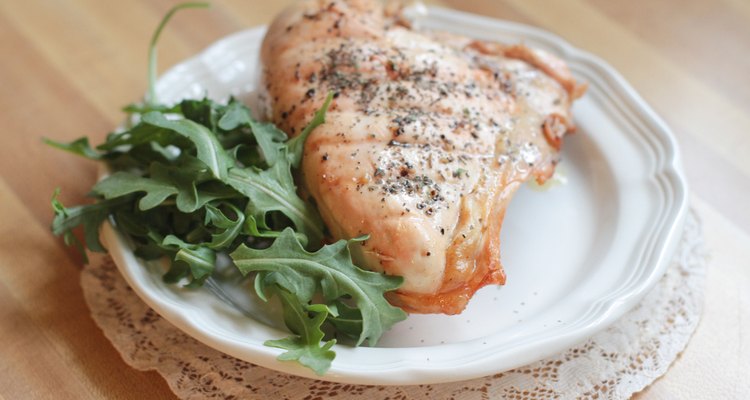
Grilled chicken breasts make a healthy and versatile entree, but run the risk of tasting boring or bland. Proper preparation and seasoning improves the flavor, tenderness and juiciness. Some knowledge of seasoning combinations and how they work together with white meat chicken helps inform cooks on which herbs and spices work best on grilled chicken breasts. Don't be afraid to try homemade seasoning blends; throw out prepared seasonings that may contain MSG and other additives once and for all.
Before Cooking
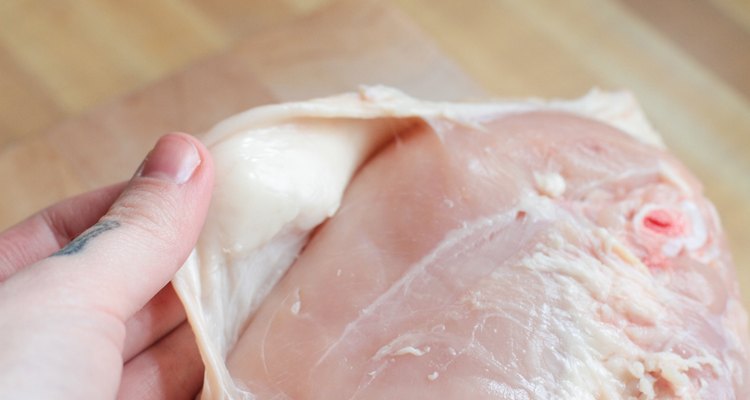
Remove skin and bones from the chicken breasts using a sharp knife, if desired. Leaving the bone and skin on a chicken breasts makes it easier to avoid overcooking them and also helps hold in juices, but also adds fat and calories and increases cooking time. Boneless skinless chicken breasts typically fit into recipes more easily and go from kitchen to table more quickly.
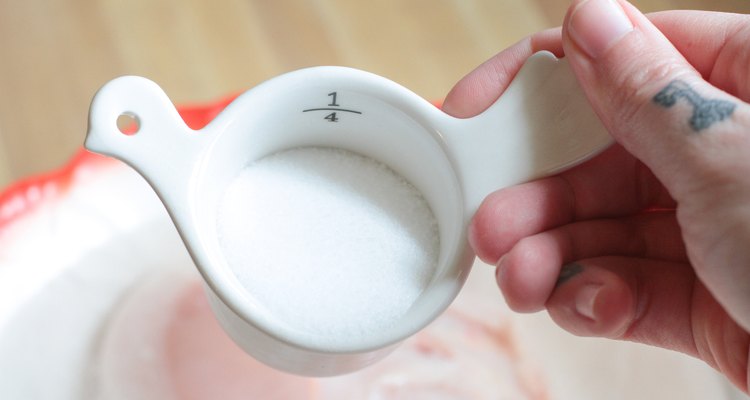
Prepare a brine in which to soak the breasts. Brines differ from marinades in that they use the physical principle of osmosis to penetrate the cells of the chicken and actually infuse flavor and moisture into them that will hold through cooking. Dissolve 1/4 cup of salt in each quart of water. Use enough salt water to completely cover the chicken breasts. Add smaller quantities of sugar, pepper and seasonings such as red pepper flakes and herbs. Soak the chicken breasts in the brine, refrigerated, for at least 1 hour and up to 8 hours.

Rinse the brined chicken breasts in cold water before marinating or seasoning them for cooking. Rinsing the breasts prevents them from tasting too salty, but keeps the flavor imparted to the inside of the breast from the brine.
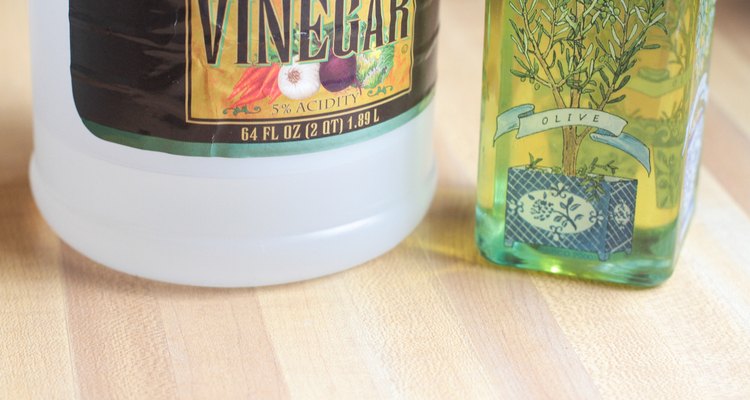
Marinade chicken breasts if desired. Vinegar, oil, seasonings and sugar comprise homemade marinades. Whisk together equal parts of oil and vinegar or another acidic liquid such as wine or juice. Mix in seasonings, salt and sugar. Coat the chicken breasts with the marinade and allow them to sit at room temperature for about 1/2 hour.

Discard or boil unused marinade. Because raw chicken has been sitting in that sauce, don't use it raw to baste on chicken while it's on the grill. Bring it to a temperature of at least 160 degrees Fahrenheit on the stovetop before brushing it on the cooking chicken.
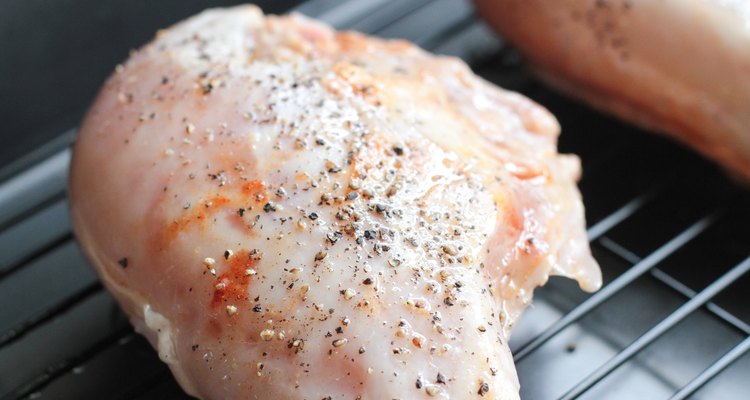
Salt, pepper and shake herbs and seasonings on chicken breasts immediately before grilling. Even if there's no time for brining or marinating, adding salt and pepper and seasonings to taste directly before cooking helps add flavor. Use garlic powder in combination with oregano, lemon and basil for a mediterranean-style flavor. Try cumin, chili powder and cayenne pepper for a spicy southwest flair. Sage, onion powder and parsley yield a traditional home-cooked chicken flavor that tastes great with a creamy rice dish. A rule of thumb for pulling seasonings out of the cabinet: If it smells good, it'll taste good.
After Cooking
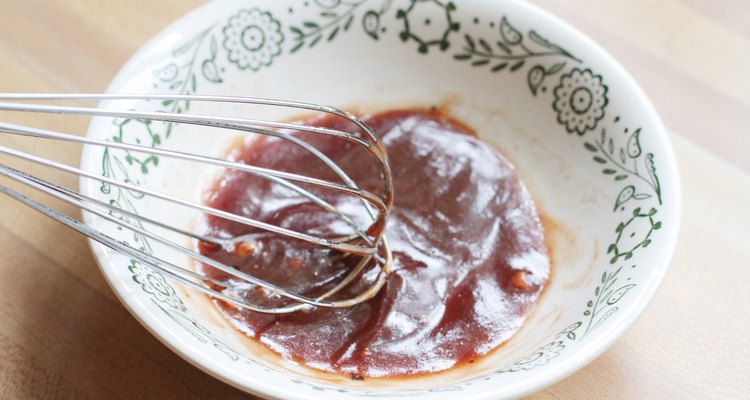
Prepare sauce to serve with chicken breasts at the table. Both cold and warm sauces work well for grilled chicken breasts. Cold sauces such as barbecue or vinaigrette can be prepared in advance and chilled. Instead of preparing homemade sauces, consider using salad dressings or commercial condiments. Mix together complementary flavors and heat or chill to serve with the breasts.
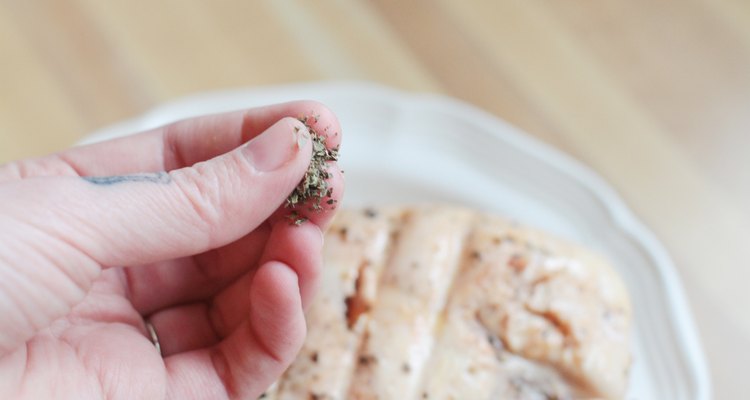
Shake on salt and pepper to taste. Add dried herbs such as basil or seasonings like dehydrated and onion at this point. Fresh raw ingredients like diced onions or peppers simply add flavors and won't incorporate into the chicken's seasoning after cooking.
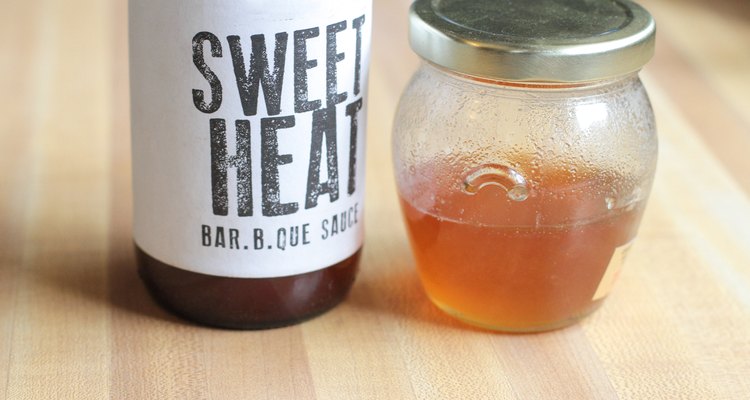
Correct any seasoning mistakes after tasting. Sweet sauces or condiments such as barbecue or honey correct too much spice. Vinegar and pepper correct too much saltiness. Additional salt cures blandness.
Related Articles

How to Roast a Chicken Leg

How to Remove Tough Stains From Collars ...
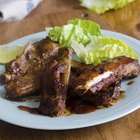
How to Marinate & Dry Rub Beef Ribs

How to Deodorize Suede Sandal Footbeds
How to Make a Brine for Quail

How to Bake Great Chicken Legs and Wings

Do You Have to Cook the Chicken After ...
Soaking Buffalo Wings in Buttermilk ...

Can I Start Marinating While My Chicken ...
Chicken Marinade With Corn Starch and ...

How to Smoke a Whole Pig Leg
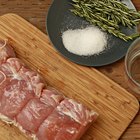
How to Brine Pork Roast
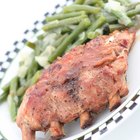
How to BBQ Ribs on a Smoker

Easy Way to Cook Chicken Breasts for ...

How to Brine a Smoked Beef Brisket
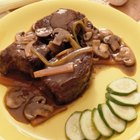
How to Use Leftover Marinade in Gravy

How to Make a Turkey Baster

How to Cook With Italian Dressing

How to Marinate BBQ Chicken Thighs & ...

Blanching Chicken Before Grilling
References
- USDA Food Safety Information: Poultry: Basting, Brining and Marinating
- The America's Test Kitchen Family Cookbook; Jack Bishop
Tips
- Even if there's no time for brining, marinating and cooking grilled chicken breasts, any combination of these steps helps yield a tasty entree. To save time, prepare brine in advance and soak the chicken breasts while at work and marinade while heating the charcoal.
Warnings
- Always cook chicken breasts to a minimum internal temperature of 165 degrees to avoid foodborne illness.
Writer Bio
Andrea Lott Haney writes articles and training materials for food industry publications. Having studied foodservice sanitation, nutrition and menu planning at Purdue University, Lott Haney has more than 10 years of experience as a catering and event planner for luxury hotels and currently tours the Midwest as a corporate customer service trainer and consultant.
Photo Credits
Sarah Vantassel/Demand Media